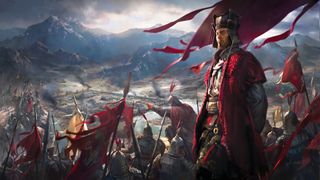
I’ve recently written two diary series for PC Gamer, and they both involved an enormous amount of killing. Well, I’ve had enough. No more swords. No more guns. No more leaking bags of skin at my virtual feet. From here on out, I’ll only be offering my enemies cake and presents. I’m going pacifist, and there’s nothing you can do to stop me.
To demonstrate my commitment to the non-violent path, I’m going to peacefully play what is by sheer weight of numbers the most violent series ever made, Total War. Specifically, I’m playing Total War: Three Kingdoms, for which Creative Assembly revamped many of the game’s secondary systems, lending elements like diplomacy, economy management, espionage, and character relationships far greater depth and nuance.
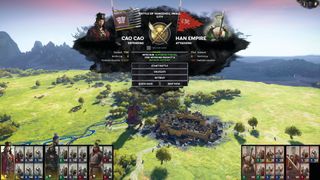
My plan is to use these new-fangled mechanics to not-fight my way to victory. I’m not going to declare war on any other faction, nor directly attack their armies in the field. If I am attacked, however, I am allowed to defend myself. Otherwise, this would be a very short article.
For this, I’m playing as the legendary general Cao Cao. Known as a ‘strategic mastermind’, Cao Cao has the unique ability to manipulate diplomatic relationships between other characters. He’s like that kid in the school playground who’d whisper in your ear that some other kid said you smell. He can also artificially improve his own relationships with other warlords, which should be useful for avoiding mass murder. Without further ado, let’s put the romance in Romance of the Three Kingdoms!
Unfortunately, there’s an immediate hitch in my plan to spread peace and love throughout ancient China, which is that I start my campaign already at war with two other factions, the Imperial usurper Dong Zhuo, and his vassal the Han Empire. Dong Zhuo himself isn’t too much of a threat, as his territory is way off to the north. But I’m surrounded by fragments of the Han Empire, and it won’t be long before they start nibbling away at what little territory I have to begin with.
The solution is straightforward. Sue for peace! Only I can’t, because the Han is a vassal state and can’t make peace without Dong Zhuo’s blessing, which he isn’t going to give because he apparently despises me. It would take far more Credibility (Cao Cao’s unique currency for diplomatic manipulation) than I currently have to make the old tyrant even neutral toward me.
There are other problems too. Because I am only a low-ranking noble in Three Kingdoms’ aristocratic hierarchy, many of the more creative diplomacy options are unavailable to me, as is the ability to field spies. At the same time, I can’t sit and do nothing. Although I’m committed to pacifism, letting everyone around me slaughter each other doesn’t seem very peaceful either. That’s when I start to build an army.
The biggest gaming news, reviews and hardware deals
Keep up to date with the most important stories and the best deals, as picked by the PC Gamer team.
Pacifist fight
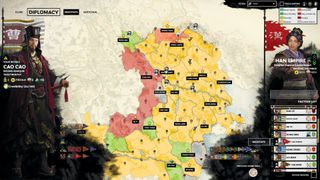
Now, let’s be clear, I’ve no intention of actually fighting anyone. But armies are a bit like genitals: if you wave them around in public, there’s a good chance everyone nearby will run away. I reckon I can use my army to lean on the Han without directly engaging them in a fight.
I build a massive army, then I head out and lay siege to some nearby farmland belonging to the Han. Again, surrounding someone’s village with a big army isn’t actually attacking it. I like to think of it more as ‘spirited negotiation’. Luckily, the Han forces in this village are led by an officer, which means I can demand their surrender.
Seeing the enormous, extremely peaceful army surrounding him, the officer wisely agrees to my terms, which are 1. Get out and 2. Stay out. Success! I got myself a nice new farm without shedding a drop of blood. I think I could get used to peace.
This is the thought running through my head when Total War casually announces that someone has murdered my dad. Tao Qian. The snake. The vermin. The coward. He’s only gone and offed my pap Cao Song. Total War’s definition is Song died of ‘unfortunate events’. But my council are all pointing the finger at Qian. They’re also urging me to declare war on the neighbouring warlord, pointing out that, mate, he murdered your actual dad.
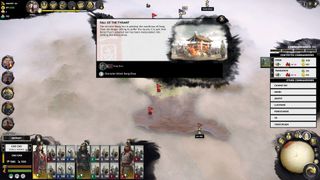
Honestly, I wasn’t expecting to deal with a dilemma like this so soon. The good news is, there are no repercussions for avoiding war at this point, so I convince my entourage that I’m biding my time. In a way this is true. I can’t let Tao Qian’s crime go unpunished. I just need to figure out a way to punish him peacefully.
No sooner have I resolved (by which I mean ‘put off’) this problem, Total War detonates another diplomatic bombshell. Dong Zhuo is dead. Less than ten turns into the game, and the mighty, usurping tyrant is worm food. Turns out he’s been murdered by his adopted son Dong Min, in what seems to be an emerging theme of dad-death.
Despite the fact I’m now dealing with a patricidal monster, I still cling on to hopes that we might end the conflict between us. To his credit, Min offers me a peace treaty, on the condition that I become his vassal and pay him a regular, extortionate tribute. Fortunately, there’s still a large buffer of territory between us, so I can decline without risking his immediate wrath.
Rest in peace
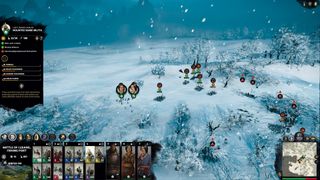
In the meantime, I concentrate on spreading peace to the Han Empire, liberating several cities from their warlike grasp. Since there are no officers in these cities, however, my ‘siege and surrender’ tactic doesn’t work. So instead I have to opt for ‘siege and starve-out’, squatting outside the city until the inhabitants get hungry enough to let me in. An entirely peaceful action, I’m sure you’ll agree. I’m not taking any food off them. I’m merely diverting incoming food toward the more urgent cause of national peace.
A couple of cities rise-up in an attempt to forcibly break the siege. Since they are attacking my forces, this counts as a defensive battle, which I am allowed to fight in the name of maintaining peace.
Using this approach, I spread so much peace through the nation that I get promoted to Second Marquis, which unlocks a bunch of new powers including espionage, forming coalitions, and additional armies. I celebrate by building a second army to deal with Han forces sniffing around my territory. I’m not going to attack them, just persuade them to march back across their own borders, like ushering a spider into a glass.
The general I hire to lead this army turns out to be an enemy spy, and in one turn she disappears from the map, taking with her some loot I got from my peaceful campaigning. Fine! I then have to hire another general and raise more forces to keep the Han armies at bay.
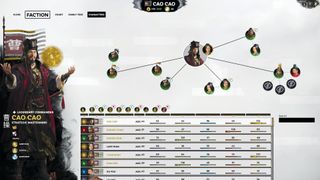
While my armies play cat and mouse with the Han, I turn my focus to preventing any further conflicts, using my Credibility to boost my diplomatic standing with several warlords bordering my territory, then signing non-aggression pacts with them. I’m too slow to stop a southern warlord named Liu Yao from raising his banners against me. But he then proceeds to do precisely nothing, so I figure I don’t need to worry too much.
After this, a powerful warlord named Yuan Shao invites me to join a coalition, which is like an alliance but less official. I accept, and suggest that he also invite Liu Bei, aka the nicest warlord in ancient China. Shao agrees to this. Finally, my mission of peace is getting somewhere!
Naturally, my council picks this moment to remind me I’m yet to retaliate against Tao Qian. What’s particularly ironic about this is that Tao Qian is dead. I’ve bided my time for so long that Qian, who was an old man at the time he decided to murder my dad, has simply succumbed to age. You’d think him dropping dead would put a pin in my council’s vengeance-balloon. But if dynasties are good at anything, it’s holding a grudge, and the council now wants me to exact my revenge upon Qian’s son and heir, Tao Ying.
I spy
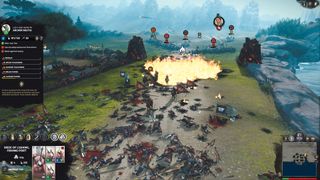
In an attempt to placate them, I dispatch a spy named Lu Zhi into Ying’s court, with the vague hope of toppling the faction from within. Before I can consider the problem any further, however, Liu Yao finally decides to act against me, attacking my most profitable trading port. I man a noble defence, but it’s ultimately swept aside by Yao’s army. Luckily, I have a sizeable peacekeeping force stationed in the area, which I use to immediately surround the trading post. I demand that Yao, who is leading the army personally, surrender. He responds by trying to break the siege, forcing me into conflict.
What results is the first proper battle I’ve had in the campaign, taking place on a forested hillside in the chill of winter. Yao’s army outnumbers mine, but much of his force is comprised of archers, while I’ve got four units of cavalry to his one. I use my horsemen to harass his archers from the flanks while my infantry engages his head-on. When the archers rout, I slam the cavalry into the rear of his infantry, and their resolve cracks. Liu Yao is killed in the midst of the fighting, struck down by one of my generals. What can I say? That’s what going to war gets you.
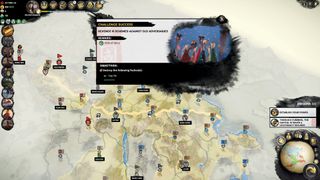
You’d think such a battle would satisfy my council’s bloodlust. But no, they still have their eyes fixed on Tao Ying. My spy has wrangled his way into the court as a noble, but there’s not much he can do there. And I can’t go to war with Ying as I’m an advocate of peace.
That said, there are plenty of other warlords who still go in for the whole ‘war’ thing. Perhaps I can make use of them. Alongside his ability to manipulate diplomatic relations, Cao Cao also has the power to incite proxy wars, which basically amounts to persuading someone to go to war on his behalf. So I drop the lovely Liu Bei a line. After some small talk he agrees to go to war with Tao Ying on my behalf.
Literally on the next turn, Tao Ying’s faction is eliminated. I’m slightly taken aback by Liu Bei’s effectiveness. In fact, he’s a little too effective, as my poor spy Lu Zhi is killed in the fighting. I’m glad that Liu Bei is my friend for the moment, as his faction is somewhat more powerful than mine. Such concerns are for another time, however. What’s important is that Cao Song’s death has been avenged, and without a drop of blood on my hands.
The story continues in part two...
Most Popular

